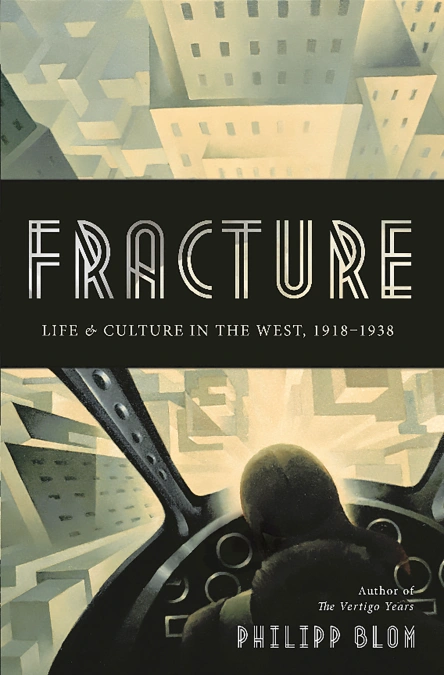In which I pull another long-unread book off the To-Be-Read shelf:
There was a time when I felt guilty about the number of unread books sitting on my shelves. They come in faster than I can read them.*
I don’t feel guilty anymore. More than once over the course of writing this book, I’ve found exactly the book I need sitting on my shelves waiting its turn. Books that I might not have known to look for out in the world. Most recently, that book was Fracture: Life and Culture in the West, 1918-1939 by German historian Philipp Blom.
Blom looks at each of the twenty-one years (which, as he reminds us in his introduction, adds up to a mere 1,567 days) from 1918 through 1938 in a separate chapter . He splits them into two parts: Postwar (1918 through 1928) and Prewar (1929 through 1938). But he does not give the reader a step-by-step narrative of the interwar years.*** Instead his structure reflects the, ahem, fractured world between the wars. He looks at
“perceptions, fears, and wishes, ways of dealing with the trauma of the war, with the energies released by industrialization, with the confusing and exhilarating identies that became possible in an industrial mass society, especially once the old values had been shattered.”
Moving from spot to spot in the Western world, he begins with jazz and works his way through the republic of Fiume, speakeasies, Charlie Chaplin, the Harlem Renaissance, the Scopes trial, Marlene Dietrich, Soviet Russia’s Five-Year Plans, and various iterations of the superman. The result is a kaleidoscopic and brilliant picture of a world that was shadowed by the war that had not quite ended and another that everyone believed was soon to come.
Fracture has become a touchstone for me as I write this book.
Who knows what I’ll find on the To-Be-Read shelves next?
*I am not attempting to downplay my responsibility here.I definitely buy books faster than I can read them. And I pick them up from the various Little Free Libraries I cross on my daily wanderings** But I also receive books from publicists for me to consider for review. (Not as often as I used to, because I don’t think it is fair to accept books for review in my current state of overwhelm.) But there is still a slow trickle. And even a slow trickle can eventually cause a flood.
**My rule in that case is that I must deposit one book for each book I take. This requires keeping track of which libraries I owe books to and which ones I am apt to pass on any given trip out the door. (Now that I think about it, I should just carry a book with me whenever I set out and donate one whether I’ve taken one or not. No record keeping involved!)
***A model I am trying to keep in mind as I struggle my way through those same years. It is all too easy to chronicle the rise of the Nazis instead of telling how Sigrid Schultz reported on the rise of the Nazis. It is a subtle difference perhaps,**** but an important one. Moreover, it is a difference that it is easy to lose track of. I write IT’S ABOUT SIGRID NOT ABOUT HITLER at the top of every Scrivener document in the draft,***** and still I wander off into the wrong story over and over.
****Or maybe not so subtle
*****I try to remember to delete it before I give a chapter to my first reader, also known as My Own True Love. He is very clear about this and doesn’t need the reminder.





